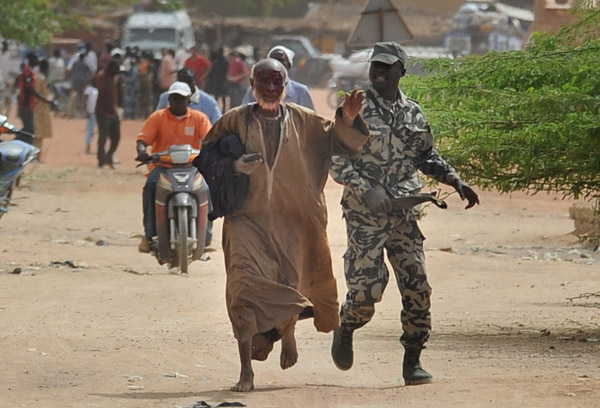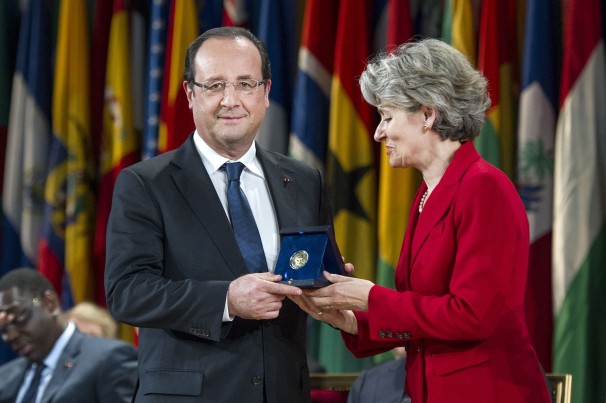www.aljazeerah.info
News & Views, June 2013
Archives
Mission & Name
Conflict Terminology
Editorials
Gaza Holocaust
Gulf War
Isdood
Islam
News
News Photos
Opinion Editorials
US Foreign Policy (Dr. El-Najjar's Articles)
www.aljazeerah.info
|
Editorial Note: The following news reports are summaries from original sources. They may also include corrections of Arabic names and political terminology. Comments are in parentheses. |
Hollande Awarded Peace Prize for Invading and Subjugating Muslim West Africa ! Shame !
Editor's Note:
The French President, Francois Hollande, received a "peace" prize for his invasion of Mali to, which pre-empted a West African Islamic movement and prevented it from expanding to other Muslim countries in the region.
In addition to guarding the French imperialist interests, particularly in uranium, Hollande did an important service to the rulers of the Zionist Empire, who are hell-bent in subjugating Muslims and in keeping them under their control.
So, it would not have been a surprise if Hollande received an award from the French military-industrial, imperialist complex.
But it's amazing that Hollande is awarded with a "peace" prize!
How can this be, when he is in fact a killer of innocent Muslims!
Shame on those in UNESCO who gave him the award!
Background Information:
 |
 |
| French Imperialist Invaders Use Divide and Rule, Ethnic Cleansing in Mali | Hollande receiving the so-called "peace" prize for invading Mali and reasserting French imperialist status in West Africa, June 5, 2013. |
French President Francois Hollande has been awarded UNESCO’s peace prize for his decision to invade Mali. This has raised questions about how an armed foreign intervention can be worthy of such an accolade.
Since 1960 the French military has intervened in Africa almost 60 times, but until now they had never won a peace prize for their efforts. There has been vast criticism over UNESCO’s choice on multiple levels. Many feel UNESCO ignored how the Malian intervention fits in the context of France’s imperialist history in West Africa, and also how Hollande has openly admitted that the Mali war is needed to safeguard French business interests in the region.
Many are concerned that UNESCO is being used to legitimize a so-called “just war”, a concept that denies the importance of peaceful diplomacy and makes hasty foreign interventions acceptable.
The war in Mali shows no sign of stopping. There have been constant allegations regarding war crimes and ethnic cleansing, with hundreds of Malian civilians thought to have been killed, many by French air strikes. One can only wonder what the families of these killed civilians think about Hollande’s peace prize.
A host of West African leaders, many of them staunch allies of France despite their lack of democratic credentials, were on hand to express their gratitude and thanks.
While Paris has fought religious extremists in Mali, they have sided with them in Syria. Some analysts have ironically speculated that Hollande may go to war in Syria to try and win the Nobel Peace Prize.
Critics say it’s hard to take such an award seriously when it blatantly pushes a political agenda. With a world full of people who have dedicated their entire lives to peace, many believe that a more deserving winner could have been selected.
French President Hollande awarded Felix Houphouet-Boigny Peace Prize for action in Africa
PARIS, June 5, 2013 (Xinhua) --
French President Francois Hollande was granted the Felix Houphouet-Boigny Peace Prize on Wednesday by the United Nations Educational, Scientific and Cultural Organization (UNESCO) in recognition of his peace efforts in Africa.
During the awarding ceremony held at the headquarters in Paris, the UNESCO highly commended Hollande for taking action to end the control of insurgents in northern Mali and bring peace and stability to the region.
In January 2013, Hollande authorised a French-led operation to secure regions in northern Mali that had been captured by rebels. The conflict in the area caused significant damage and destruction to the country's priceless cultural heritage, including in Timbuktu, famous for its World Heritage-listed historic center and a large collection of centuries-old Islamic manuscripts.
In February, Hollande, together with UNESCO Director-General Irina Bokova and Malian President Dioncounda Traore paid a visit to the site in northern Mali.
"What was targeted in Timbuktu was not just the heritage of one region or people, it was World Heritage," said Bokova during the award ceremony.
"All of us have reason to be proud of France's decision to stand by Mali - at the request of President Traore and with the support of the United Nations - to protect the peoples and culture of that country," said Bokova.
For the Director-General protecting heritage is about building a culture of peace. "Culture is not just about monuments," she stated. "Protecting culture means protecting people, giving them the strength and confidence to rebuild and to look into the future."
"The Jury appreciated the solidarity shown by France to the peoples of Africa," said the Jury's President Joaquim Chissano. The Jury therefore made the decision on Feb. 2, 2013 to award the Felix Houphouet-Boigny Peace Prize to Hollande "for his great contribution to peace and stability in Africa."
Traore expressed his gratitude to Hollande.
Hollande was presented with a peace diploma, a gold medal, and 150,000 U.S. dollars. He will donate the money to two charities, one to support women in Africa and one to assist war veterans.
In his acceptance speech, Hollande praised the strength of UNESCO's work and hailed its dedication in promoting cultural and social progress, saying "So, receiving the Houphouet-Boigny prize here at UNESCO takes on a special meaning."
Hollande also underscored the urgency of the French operation in Mali. "In the face of hatred, we had to intervene ... Any delay would have been disastrous ... It was for the women and children of Africa that France intervened," he stated.
Created in 1989, the Houphouet-Boigny Peace Prize is intended to honor individuals or organizations that have made a significant contribution to promoting, seeking, safeguarding or maintaining peace.
Hollande joins a list of illustrious past laureates that includes Nelson Mandela, Yitzhak Rabin, Shimon Peres, Yasser Arafat and Luiz Inacio Lula da Silva.
A number of leaders of West Africa and countries of the Sahel region attended the ceremony.
Editor: Mu Xuequan
=============================Malian troops launch assault on Tuareg rebel bastion
AFP, June 6, 2013
By FRANCE 24 (text)
Malian troops seized a village after heavy fighting with Tuareg separatists on Wednesday and are advancing towards the town of Kidal, the last rebel stronghold, the army said.
“Our troops have taken Anefis this morning after intense fighting,” army spokesman Colonel Souleymane Maiga said.
Moussa Ag Acharatoumane, Paris-based spokesman for rebel group MNLA (National Movement for the Liberation of Azawad), said in a statement that MNLA forces were fighting Malian soldiers in Anefis, but did not provide further details.
An army source quoted by AFP said that ten Tuareg rebels and two Malian soldiers were killed in the fighting.
Another army officer said rebel fighters had abandoned their vehicles and fled Anefis, heading towards Kidal.
A local aid worker in Kidal told Reuters by telephone that the town was deserted and MNLA fighters who had been patrolling the streets had disappeared following news of Anefis’s fall.
“We no longer see the MNLA people. Shops, businesses, the market, everything is closed today. We are all staying at home,” the resident said, requesting not to be named.
Ethnic cleansing
It was the first combat between the MNLA separatists and the Malian army since a French-led military offensive launched in January against Islamists in northern Mali.
The French campaign ended the 10-month domination of the desert region by al Qaeda-linked groups but left the Tuareg rebels in control of Kidal.
Malian Foreign Affairs Minister Tièman Hubert Coulibaly said that leaving part of the country in rebel hands was “nonsense” in an interview with FRANCE 24 on Wednesday.
His government has accused MNLA guards of ethnic cleansing in the region.
“The government must protect the citizens of Kidal – just a few days ago nearly 200 people were arrested by the MNLA just because they are black,” he said.
The sudden drive to reclaim the rebels’ last bastion comes as the government prepares for national elections, hoped to be held next month.
“We need to enable peace to be settled in Kidal so that we can have peaceful and fair elections by the end of July,” Coulibaly said.
No negotiating
The MNLA has rejected Bamako’s calls for it to lay down its weapons, saying it would resist any attempt to retake Kidal. It has said it is open to negotiations with the government if northern Mali’s right to self-determination is recognised.
France said it supported the Malian government’s efforts to reestablish its presence in the whole of Mali.
“There can only be and should only be one army in Mali and it must be able to be deployed in every part of the country,” the French foreign ministry said in a statement on Wednesday.
“That is why we call on all armed groups to lay down their weapons and pursue peace talks with Malian authorities,” it said.
The MNLA was not targeted by the French offensive and has since been able to retake some areas, including Kidal. But this has strained relations between France and the transitional government in the southern capital, Bamako.
The MNLA rose up early last year, calling for the creation of a Tuareg homeland in northern Mali. It joined forces with al Qaeda-associated fighters and together they overran the north, but the better armed Islamists quickly took control of the rebellion.
(FRANCE 24 with wires)
Fair Use Notice
This site contains copyrighted material the
use of which has not always been specifically authorized by the copyright
owner. We are making such material available in our efforts to advance
understanding of environmental, political, human rights, economic,
democracy, scientific, and social justice issues, etc. We believe this
constitutes a 'fair use' of any such copyrighted material as provided for
in section 107 of the US Copyright Law. In accordance with Title 17 U.S.C.
Section 107, the material on this site is
distributed without profit to those
who have expressed a prior interest in receiving the included information
for research and educational purposes. For more information go to: http://www.law.cornell.edu/uscode/17/107.shtml.
If you wish to use copyrighted material from this site for purposes of
your own that go beyond 'fair use', you must obtain permission from the
copyright owner.
|
|
|
|
||
|
||||||


